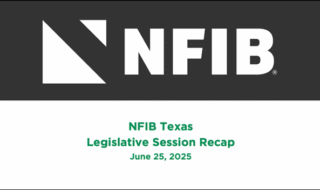March 23, 2025
Senate also passes bill giving UI benefits to striking workers
State Director Anthony Smith reports from Salem on the small business agenda for the legislative week ending March 22.
March 21 was Day 60 of the 160-day 2025 Oregon Legislative Session. The date also marked the first of several important deadlines. In most committees, bills must have been scheduled for a work session by the end of March 21 to stay alive. Theoretically, this deadline should effectively kill most of the bills that won’t be moving forward this year.
However, this does not seem to be the case this year. There are always committee chairs who will post a large number of “placeholder” bills (usually directing a state agency to perform a study), just in case something comes up at the last minute and they need a bill with a broad “relating to” clause. But as of right now, it looks like most committee chairs are utilizing this tool to sidestep the first major deadline of the session – and as a result, nearly every bad bill introduced this year is still alive and well.
Hundreds of bills are scheduled for work sessions over the next two and a half weeks. Many of them have not yet had a public hearing, in which case they are posted for a “public hearing and possible work session.” Although rare in past sessions, these bills occasionally will move out of committee – and the placeholder bills are especially susceptible to last-minute surprises.
The only thing we can do is monitor everything as closely as possible and be ever-vigilant for late-breaking amendments. If something particularly egregious slips through the cracks, we still have an opportunity to defeat it in the second chamber (but let’s hope that doesn’t happen!)
Here’s what’s been happening in the Oregon Capitol – and what’s coming up:
UI Benefits for Striking Workers Passes the Senate with Bipartisan Opposition
Senator Janeen Sollman (D-Hillsboro) and Sen. Jeff Golden (D-Ashland) joined a unanimous Senate Republican caucus in opposing SB 916 when it was up for a vote in the Oregon State Senate on March 20. The bill narrowly passed by just one vote and now heads over to the Oregon House of Representatives for further consideration.
As you might recall, NFIB included this issue on our 2025 Oregon State Member Ballot. The results couldn’t have been clearer, with 88% of respondents saying “NO” when asked if striking workers should be eligible to claim Unemployment Insurance benefits.
NFIB issued a KEY VOTE alert for this measure. It will likely be featured on NFIB’s next official Voting Record for Oregon. Here’s a link to our 2023-24 Voting Record, in case you’re interested. Here’s an excerpt from the KEY VOTE alert:
Allowing UI benefits for workers who voluntarily leave their jobs to go on strike would not only add cost to the system, but it would also tip the balance in favor of unions during contract negotiations and lead to more strikes. Essentially, employers would be subsidizing union work stoppages and paying workers to go on strike – or worse, making small businesses pay for the labor disputes of their larger corporate competitors.
If this bill continues to move forward – and we expect it will at this point – please be on the lookout for a future NFIB Action Alert. But know that it’s never too early to contact your state representative and encourage them to OPPOSE SB 916!
If you’d like to read more about this bill and its path through the legislative process, this is a good article from OPB’s Dirk VanderHart.
New Threats: Workforce Standards Boards
Not only do labor unions want their members to be eligible for UI benefits while on strike, but they also want to bypass the state legislative process entirely for future pay raises, changes in benefits, and updates to workplace health and safety standards.
Two bills have emerged in the Oregon House that NFIB is opposing – HB 3838, which would establish a Home and Community-Based Services Workforce Standards Board, and HB 2548, which would create an Agricultural Workforce Labor Standards Board. Both bills recently received public hearings in the House Committee on Labor and Workplace Standards. Here’s an excerpt from NFIB’s testimony on HB 3838:
NFIB represents small employers of every business type, including providers of in-home and long-term care. But regardless of industry sector, it’s small business owners that are best situated to be responsive to the needs of their customers and employees, not an unelected board of appointees with no accountability to the people of Oregon.
HB 2548 is even more problematic, as it also seeks to eliminate at-will employment in the entire agricultural sector. Here’s a link to our Ag Coalition testimony that was submitted for the record, and here’s an excerpt from the NFIB Action Alert we currently have active for this bill:
Rather than unionizing farm-by-farm, the Agricultural Workforce Labor Standards Board would have the power to bargain on behalf of agricultural workers at the industry sector level…. HB 2548 also eliminates at-will employment for agriculture and dictates how farm employers can discipline or terminate workers. The bill creates a private right of action against employers who make termination or disciplinary decisions that an employee or trial attorney disagrees with.
HB 3838 and HB 2548 are both scheduled for work sessions in the House Committee on Labor and Workplace Standards on April 2.
More Lawsuits – And This One Impacts Your Insurance Premiums
For at least the last decade, plaintiffs’ attorneys in Oregon have been trying to get the insurance industry added to Oregon’s Unlawful Trade Practices Act (UTPA), which allows an aggrieved party, on their own or via class action, to sue both an insured and an insurer. This increase in liability will impact all lines of insurance including health insurance, property and casualty insurance, and medical malpractice insurance.
SB 174 would move Oregon’s insurance market away from a proven model that is working for most Oregonians to one that incentivizes litigation. Oregon already has a system in place for consumers to bring a lawsuit or file a complaint with the state’s insurance commissioner if they feel they have been treated unfairly. Under Oregon’s Unfair Claims Settlement Practices Act, the insurance division can order insurers to pay claims, as well as require restitution and levy fines against insurers that act in bad faith.
The Senate Committee on Judiciary held a public hearing on the bill on March 5. NFIB is part of a large coalition opposing the measure. Here is an excerpt from NFIB’s testimony:
Additional enforcement under Oregon’s UTPA will lead to more lawsuits and increased costs for insurers. This creates market pressure to increase premiums for insurance customers. For many Oregon consumers and businesses, this would mean policyholders will have to pay more for the same coverage – and if they cannot afford to pay more, they risk leaving themselves under-insured.
As noted in our coalition testimony: The Unfair Claims Settlement Practices Act is based on a model act developed by the National Association of Insurance Commissioners that specifically includes a note from NAIC that says: “A jurisdiction choosing to provide for a private cause of action should consider a different statutory scheme. This Act is inherently inconsistent with a private cause of action.”
SB 174 is scheduled for a work session in the Senate Committee on Judiciary on March 25.
Prior Legislative Reports
— March 8: NFIB Testifies for Bill Correcting UI Tax Trap
— February 14: Bad Age-Discrimination Bill Resurfaces. Flurry of Activity on Estate Tax
— February 1: Oregon Legislators Begin Work on 2,500 Bills
NFIB is a member-driven organization advocating on behalf of small and independent businesses nationwide.
Related Articles














